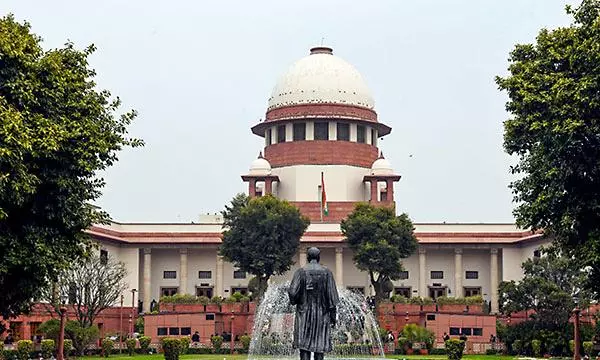
State cannot take over all private property, says Supreme Court
Apex court delivers judgement on whether government can take over private property for distribution to subserve the larger good of society

The Supreme Court on Tuesday (November 5) ruled in a landmark judgement that the State does not have the right to take over all private property in the name of common good.
A nine-judge Constitution Bench led by Chief Justice DY Chandrachud delivered the ruling with an 8-1 majority.
There were three judgements – Chief Justice Chandrachud wrote one for himself and six colleagues, Justice BV Nagarathna wrote a concurrent but separate judgement, and Justice Sudhanshu Dhulia gave a dissenting judgement.
Also Read: Dangerous to say private property can't be taken over to subserve common good: SC
The judges on the Constitution Bench were Chief Justice DY Chandrachud, and Justices Rishikesh Roy, BV Nagarathna, Sudhanshu Dhulia, JB Pardiwala, Manoj Misra, Rajesh Bindal, SC Sharma, and AG Masih.
The court had in April said that it would be dangerous to say that private property of an individual cannot be regarded as material resources of community and taken over by state authorities for common good.
Objection by property owners
On Tuesday, the apex court gave the judgement on whether state governments can take over private property for distribution to subserve the larger good of society.
Also Read: Meet Justice Sanjiv Khanna, India’s next CJI known for rulings on Electoral Bonds, Article 370
The observations followed a plea by the Property Owners Association of Mumbai which submitted that private property cannot be taken over by authorities under the garb of constitutional schemes of articles 39 (b) and 31 C of the Constitution.
The ruling
The case relates to Article 31C of the Constitution that protects laws made by the State to fulfill directive principles of state policy. These are guidelines laid down by the Constitution for governments to follow while making laws and policies.
Article 31C protects Article 39B which lays down that the State shall direct its policy towards ensuring that the ownership and control of the material resources of the community are so distributed as best to subserve the common good.
Also Read: Every institution can be improved, but it doesn't mean it is fundamentally flawed: CJI
Commenting on this, the chief justice said, “Does material resource of a community used in 39B include privately-owned resources? Theoretically, the answer is yes, the phrase may include privately-owned resources. However, this court is unable to subscribe itself to the minority view of Justice Iyer in Ranganath Reddy. We hold that not every resource owned by an individual can be considered a material resource of a community only because it meets the qualifier of material needs.”
“The inquiry about the resource in question falls under 39B must be contest specific and subject to a non-exhaustive list of factors such as nature of resource, the characteristics, the impact of the resource on well-being of community, the scarcity of resource and consequences of such a resource being concentrated in the hands of private players, the public trust doctrine evolved by this court may also help identify resources which fall under ambit of material resource of a community," continued the judgement
The 1977 SC ruling
A seven-judge bench in 1977 had ruled with a 4:3 majority that all privately-owned property did not fall within the ambit of material resources of the community.
Also Read: Justice Govind Mathur: 'SC should look at reforms rather than cosmetic changes'
Justice Krishna Iyer, in a minority opinion, held that both pubic and private resources fell under the ambit of “material resources of the community” under Article 39B.
Justice Nagarathna’s judgement
In a separate judgement, Justice Nagarathna wrote, “Justice Krishna Iyer adjudicated on the material resources of a community in the backdrop of a constitutional and economic structure which gave primacy to the State in a broad sweeping manner. AS a matter of fact, the 42nd amendment had included socialist in the Constitution. Can we castigate former judges and allege them with disservice only because of reaching a different interpretative outcome?”

